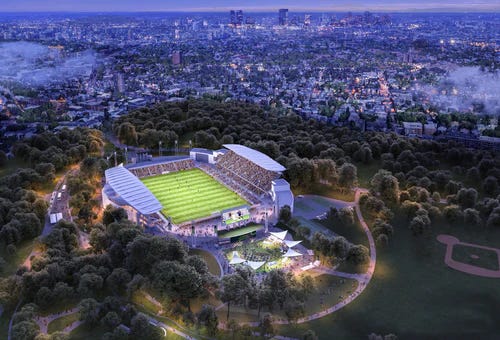06.20.2024
Middle-class towns, million-dollar home prices | Junket to Denmark by top Boston officials draws scrutiny | Wu’s stadium plan a sweetheart deal for pro soccer team | Quick hits |
News tips? Story ideas? Email us at sbvanvoorhis@hotmail.com
Taxpayer-financed stadium boondoggle? Boston could wind up heavily subsidizing decrepit White Stadium’s transformation into a professional soccer palace, leading expert contends
Boston Mayor Michelle Wu has pitched her ambitious, $100 million renovation of a 1940’s-era school district stadium in Franklin Park as a win-win for taxpayers and students.
City Hall and Boston Unity Soccer Partners would split the cost of the project, forking over $50 million each to transform White Stadium into a showcase for women’s professional soccer and school athletics.
But a close analysis of the proposal by one of the world’s leading sports business experts suggests that Wu’s proposal is anything but a game-winning financial decision for the city.
Boston could wind up effectively subsidizing the development of a stadium for a women’s pro soccer team to the tune of tens of millions of dollars, Andrew Zimbalist, one of the world’s top sports business experts, tells Contrarian Boston.
The city’s $50 million contribution to the proposed pro soccer field/school athletics complex far exceeds the price tag of even the most expensive high school stadium project in Massachusetts, contends Zimbalist, professor emeritus of economics at Smith College.
The White Stadium proposal is even higher than the $35 million that school officials in Arlington, Texas plan to spend on a new stadium there - and that’s in a state that’s bananas over high-school football.
By comparison, most high school sports complex/stadium projects locally fall within the $5 million to $20 million range, with Lowell spending $8 million on the renovation of Cawley Stadium.
The $50 million that Boston would contribute looks even more questionable when the scope of the city’s side of the project is considered: a new grass field, an eight-lane track, and the East Grandstand, which will include BPS athletics facilities, Zimbalist noted in an op-ed piece that recently ran in CommonWealth Beacon.
Will the track be paved in gold?
To Zimbalist, this is a clear sign that the city is prepared to spend “at least $30 million and maybe as much as $45 million to make a deal with a women’s professional soccer team.”
That’s bad enough. But that’s before you look at where money is coming from and where it is going.
Wu’s proposed deal represents a subsidy from the struggling Boston Public Schools - which has presided over decades of decay at White Stadium with its typical, catastrophically negligent touch when it comes to building maintenance - to a group of investors led by Jennifer Epstein, daughter of Celtics co-owner and top Hub developer Robert Epstein.
Oh yeah, and don’t forget Linda Henry, CEO of the Boston Globe and wife of billionaire Red Sox owner John Henry, who is also a limited investor.
And the figures above may actually be on the conservative side. Zimbalist notes that construction overruns are likely to push the cost of the project even higher, forcing the city to cough up millions more than the planned $50 million.
“That number is likely to go up given the phenomenon of cost overruns, which are virtually ubiquitous,” Zimbalist said.
A spokesperson for the mayor, in an email, defended the project, calling it a “public-private partnership that will benefit BPS students and community members.”
Swell - that really clinches it.
Meanwhile, a spokesperson for Boston Unity Soccer Partners suggested that Zimbalist, author of the classic “Baseball and Billions” and who has testified numerous times over the years before Congress, just didn’t quite grasp the full scale and breadth of the White Stadium renovations.
In particular, the spokesperson maintained that Zimbalist’s analysis failed to reflect the “order of magnitude” of the benefits that will flow to Boston Public Schools from the $100 million stadium project.
Now that’s rich. If we are going to bet on who understands the project and its pitfalls better, we’re going with Zimbalist.
Greater Boston’s fastest growing club: Towns where median home prices top $1 million
Just when you think the housing crisis can’t get any worse, it does.
There has been a surge in the number of towns and suburbs where the median home price has either crossed the $1 million mark or is fast approaching seven figures, the latest stats from The Warren Group show.



